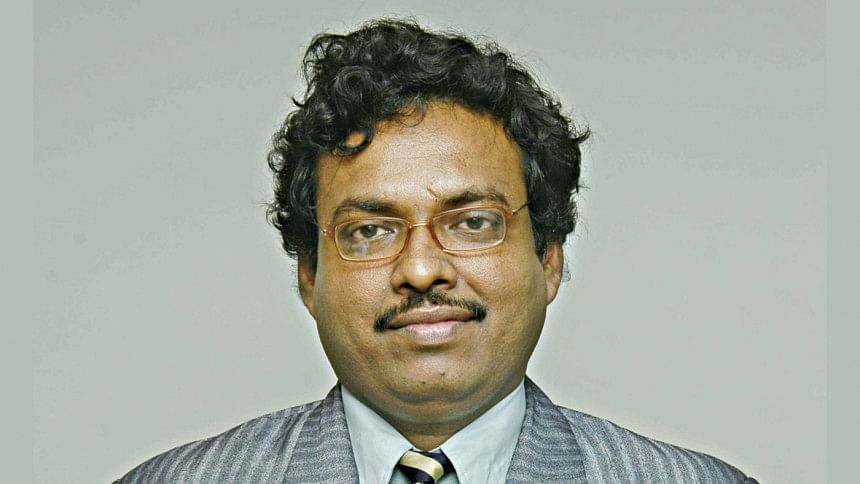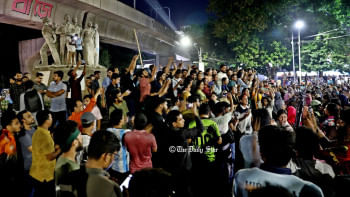Tribute by Mahfuz Anam: Mizanur Rahman, a life of excellence achieved through sheer willpower

He wanted to be an exceptional journalist, and he was. It was as if he willed himself to be what he wanted to be. That was Mizan, the amazing self-made person who mesmerised us with his professional and human qualities. Never relenting with his tough questions, never forgetting to smile as he did so.
He was born in 1967, the year I joined Dhaka University. His early education was in Jhalokathi and yet he was better educated than many others who had better initial educational opportunities, proving that self-motivation can easily overcome whatever educational discrepancies you may have faced early in life. He did his BA from BM College, Barishal, studying accountancy and yet he distinguished himself as a journalist, again proving that one can gain expertise in any discipline regardless of the subjects studied at the BA or MA level. His life is an example of excelling through sheer willpower. If you want to do something earnestly enough, you can do it. That's what Mizan believed in, that's what he proved and what his life's work stands for.
He was only 53 and already he had become, unquestionably, the best amongst us. So young and yet so wise, so committed, so insightful and passionate, so curious, so untiring in his work, and so determined to get to the bottom of what needed to be told. We journalists are a bit of a jack of all trades, and definitely not a master of any. But Mizan was different. He was the master of what he would write on. While we would hover above the surface, he would delve deep—while ours would be an exercise in coming to a quick conclusion, his would be a laborious and untiring search for all the aspects of a story and addressing all its main and nuanced angles.
Many stumble into journalism, some get pulled into it, some saunter in because there is nothing better to do. Others choose it out of a delusion of being good writers. But some—and there are very few—stride into it with vigour, energy and a clear purpose, to use this magnificent profession for the betterment of a wider group. Mizan was of this rare breed.
Matiur Rahman, the editor of Prothom Alo, wrote in his tribute last Wednesday that Mizan wanted "back" his first ten years of journalism which he had spent before joining his favourite newspaper, Prothom Alo, implying that those were not well-spent. This only speaks of Mizan's desire to spend every minute of his profession in ways that were purposeful and of service to humanity. He loved his profession, knew its power, was aware of what it could do to uphold the rights of the oppressed, and he wanted to do just that—serve a wider social cause.
If we look back on the worldview of Mizan, it becomes clear that as a journalist, taking up the cause of justice was almost natural for him. He understood the fundamental importance of a well-functioning and fair judicial system. He was aware of the all-encompassing and intricate web of laws which bind a society together and the tremendous good that a just legal system can do for the people. So the constitution, the legal framework, the judicial system, the various ways it functions became his natural field of work. Once having chosen it, he devoted his full energy to learning about it. He devoted his energy to developing his expertise in it. He started reporting and writing columns on the judiciary which began to attract the attention of lawyers, judges and all the practitioners of the legal system. Very soon, he emerged as an authentic voice pointing out the anomalies of various laws and the disservice that any miscarriage of justice was doing to us as a nation.
His write-ups on the constitution and how the various amendments impacted on its original spirit and purpose are among his most important legacy for us to build on. His book on the constitution and the caretaker government controversy is an important contribution in this field. Rule of law was his article of faith, and any aberration in it was a sacrilege he would always be ready to fight against.
Many of us go abroad but when he travelled, he was always looking for materials to write on. His focus was always on journalism and never on tourism. He loved history but his interest was less in seeing its physical remnants and much more in delving into it so that he could tell something new for the benefit of his readers.
His desire to know more about our Liberation War was never-ending. He wanted to study it in depth, not from a historian's perspective but from that of a journalist, to tell the story of how a nation began to mobilise, became united to fight, picked up arms and gained victory over a brutal army. He was in constant search for new materials on our independence struggle so he could study it and report on it.
Bangabandhu's assassination was another core area of his focus. He understood the importance of that single event and how the assassination impacted on our history and the future development of Bangladesh. Hence his relentless search to learn more about it. It will not be an exaggeration to say that he was obsessed with it. He would collect documents about this tragic event from all possible places and libraries and would write on them. These articles were so important that a book was published under the title of "Markin Daliley Mujib Hattya" (or Mujib killing in US documents) by Prothoma publishers, a subsidiary of Prothom Alo.
He had this amazing quality of perseverance. He would stay with the subject of his inquiry over a very long time. He knew how to look through a huge pile of documents and extract what he was looking for. Those who have never done so would not fully appreciate the uniqueness of this quality. His earnest desire was to go to Washington, DC and do research in the Library of Congress on the US' role during our Liberation War and on the assassination of Bangabandhu. While in DC, he showed an extraordinary capacity for research, a rare quality among today's journalists, and wrote an amazing series of stories from State Department documents on our Liberation War that lasted for years. According to the Prothom Alo editor, he wrote over several years and every year he would bring out some new and interesting facts about his favourite subject.
A very important lesson that we journalists can learn from him is the importance of specialising in a particular area and then covering it as thoroughly as possible. He chose the world of the constitution, of the rule of law, of rights and responsibilities, of freedoms and obligations, and became an authoritative voice on all of them.
I was Mizan's fan. I read his columns and marvelled at the research that went behind it. I followed his arguments and realised how intricate and well-founded they were. I appreciated his zeal to make a point and felt overwhelmed at the vigour with which he did so. I remain eternally grateful to him for his personal words of encouragement and support and legal advice during my dark days in 2016 of 84 cases, 16 of which were for sedition and the rest for defamation.
It was the "person" Mizan that always won my heart. Ever gentle, polite to a fault, and humble as one can be and ever smiling, he was a gentleman par excellence. He would seldom relent in an argument because of his solid facts but would never be overbearing in letting you know that your facts were wrong. In meetings his views would always be short, precise, to the point and refreshing. I respected him for his work, loved him for his human qualities and admired him for the height he took journalism to. He was among the very few journalists who really saw the beauty, majesty, intellectual width and moral power of ethical journalism and its capacity to serve society. Mizanur Rahman Khan, our favourite Mizan, did. And now he is gone.
Above everything else, Mizan truly represented that critical free spirit that makes an independent journalist. He adored the principle of freedom of expression and freedom of the press, and all his life, he worked for it and stood by it. He knew that without a free press there cannot be democracy, and without democracy a rights-based society cannot be established.
May we all learn to serve the cause of independent journalism as Mizan did.
Mahfuz Anam is Editor and Publisher, The Daily Star.

 For all latest news, follow The Daily Star's Google News channel.
For all latest news, follow The Daily Star's Google News channel. 



Comments